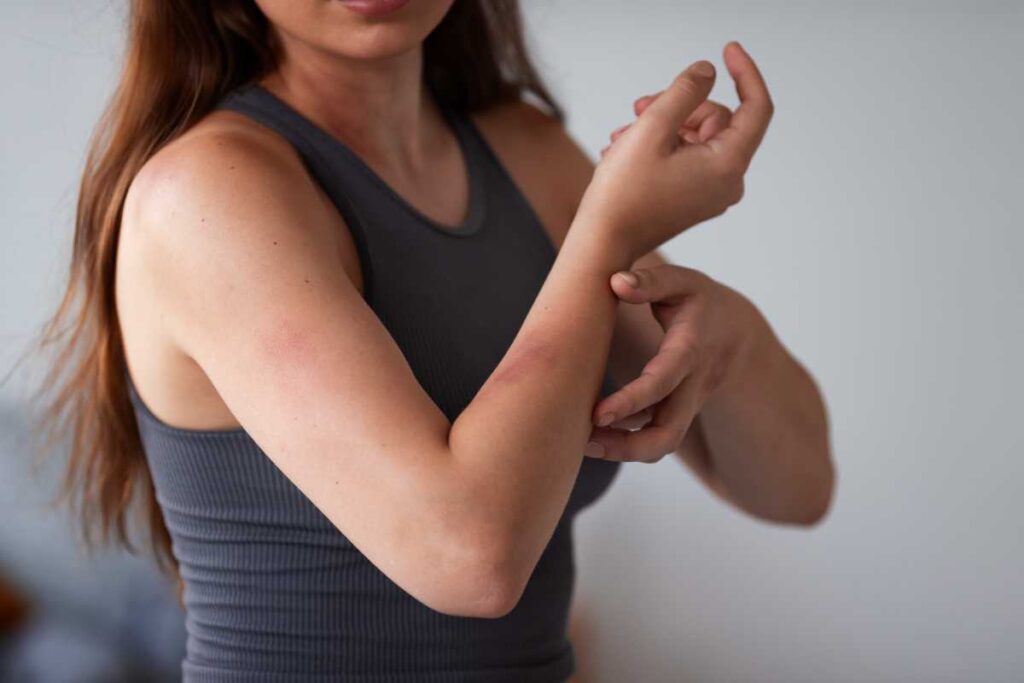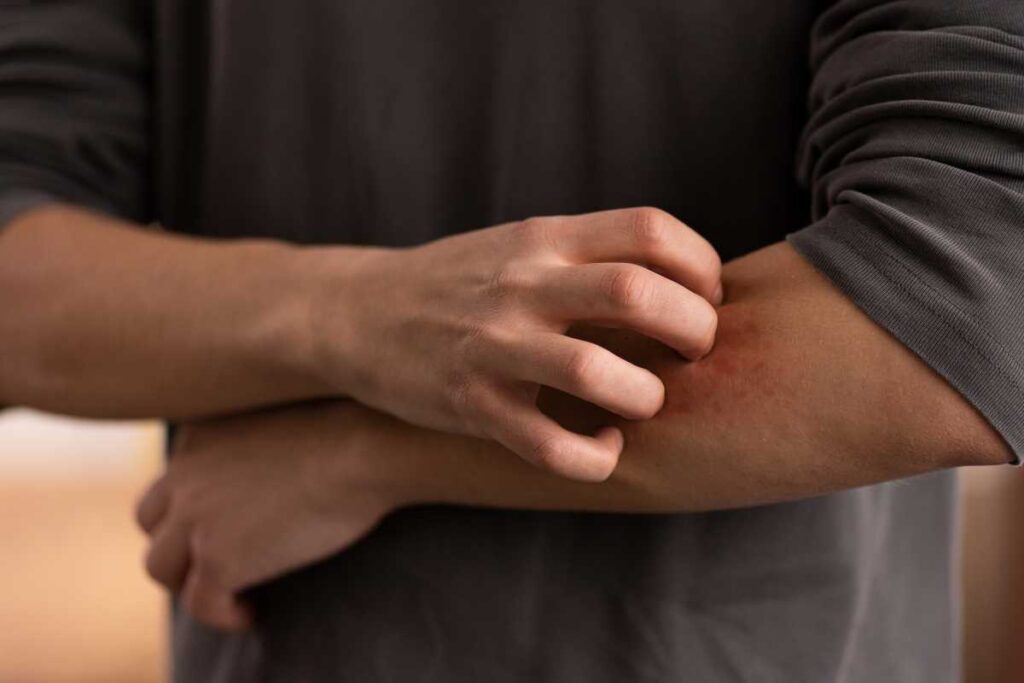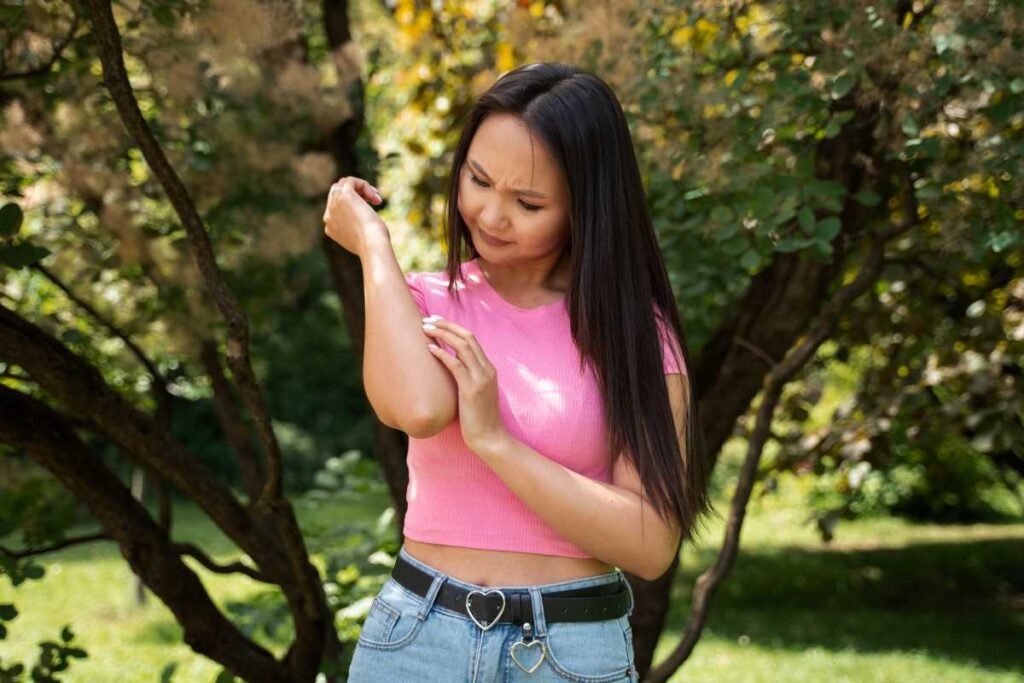Anxiety is a common emotional and psychological response that can manifest in various physical symptoms, including itching. Many individuals experiencing anxiety may notice unexplained sensations on their skin, leading to discomfort and distress. In this blog, we will delve deeper into the connection between anxiety and itching, discuss potential causes, identify symptoms, and explore effective treatment options to manage this issue.

Understanding the Connection Between Anxiety and Itching
Anxiety triggers the body’s “fight or flight” response, activating multiple physiological processes. This response can affect various systems in the body, including the skin. Let’s explore how anxiety can lead to itching:
1. Increased Sensitivity
Anxiety often heightens awareness of bodily sensations. People experiencing anxiety may become hyper-aware of their skin’s condition, leading to an increased perception of itching. This heightened sensitivity can make individuals more likely to notice normal sensations, interpreting them as discomfort.
2. Skin Reactions
When stressed or anxious, the body releases chemicals like histamines and cortisol. Histamines are responsible for allergic reactions and can cause skin irritation, redness, and itching. Additionally, cortisol can impact skin hydration and integrity, contributing to dryness and irritation.
3. Compulsive Behaviors
Anxiety can lead to compulsive behaviors, including scratching or rubbing the skin. This can exacerbate the feeling of itchiness, creating a vicious cycle of discomfort and irritation. The act of scratching may temporarily relieve the itch but can ultimately lead to skin damage, further intensifying the sensation.
4. Nerve Sensitivity
Anxiety may affect the nervous system, leading to increased sensitivity of nerve endings in the skin. This heightened sensitivity can cause sensations of itchiness, even in the absence of an identifiable physical cause. The brain may interpret normal nerve activity as discomfort, triggering an urge to scratch.
5. Psychological Factors
Psychological stressors can lead to a state of heightened arousal, which may cause physical symptoms such as itching. This connection between the mind and body can make it difficult to distinguish between anxiety-related itching and other skin conditions.
Symptoms of Anxiety-Induced Itching

Recognizing the symptoms of anxiety-related itching is crucial for seeking appropriate treatment. Common symptoms include:
- Localized Itching: Itching may occur in specific areas of the body, such as the arms, legs, or scalp. It can vary in intensity from mild to severe.
- Redness or Irritation: The skin may appear red, inflamed, or irritated due to scratching or histamine release. This can lead to further discomfort and a desire to scratch.
- Flaking or Dry Skin: Anxiety can lead to dry skin, exacerbating itching. Individuals may notice peeling or flaking, especially in sensitive areas like the eyelids or around the mouth.
- Burning Sensation: Some individuals may experience a burning sensation in addition to itching. This can be particularly distressing and may interfere with daily activities.
- Worsening During Stressful Situations: Itching may intensify during moments of heightened anxiety or stress. Identifying triggers can help individuals manage their symptoms more effectively.
Treatment Options for Anxiety-Induced Itching
Managing anxiety-related itching involves addressing both the underlying anxiety and the physical symptoms. Here are effective treatment options to consider:
1. Therapy for Anxiety
- Cognitive Behavioral Therapy (CBT): CBT is a structured, goal-oriented therapy that helps individuals identify and change negative thought patterns contributing to anxiety. By addressing these thoughts, individuals can reduce both anxiety levels and associated symptoms like itching.
- Mindfulness and Relaxation Techniques: Practices such as meditation, deep breathing exercises, and progressive muscle relaxation can help calm the mind and body, reducing anxiety levels and alleviating physical symptoms.
2. Topical Treatments
- Moisturizers: Applying fragrance-free moisturizers can help soothe dry skin and reduce itching. Look for products with ingredients like ceramides, glycerin, or hyaluronic acid to maintain skin hydration effectively.
- Anti-Itch Creams: Over-the-counter hydrocortisone creams or calamine lotion can alleviate localized itching and inflammation. These products help reduce the immune response in the skin, providing relief.
3. Medications
- Antihistamines: Over-the-counter antihistamines, such as diphenhydramine (Benadryl) or cetirizine (Zyrtec), may provide temporary relief from itching caused by histamine release. However, consult a doctor before using them regularly, as they may cause drowsiness.
- Prescription Medications: In more severe cases, a doctor may prescribe anti-anxiety medications (like SSRIs or benzodiazepines) or topical corticosteroids to manage both anxiety and itching. These medications can help regulate mood and reduce skin inflammation.
4. Lifestyle Modifications
- Regular Exercise: Physical activity is a natural stress reliever and can help lower anxiety levels. Exercise also increases blood circulation, promoting skin health. Aim for at least 30 minutes of moderate exercise most days of the week.
- Adequate Hydration: Drinking plenty of water is crucial for maintaining skin hydration, reducing dryness, and minimizing itching. Aim for at least 8 glasses of water a day, adjusting based on your activity level and environment.
- Balanced Diet: Consuming a diet rich in fruits, vegetables, lean proteins, and healthy fats can support overall skin health and reduce inflammation. Foods high in omega-3 fatty acids, such as fatty fish, walnuts, and flaxseeds, can be particularly beneficial.
5. Stress Management Techniques
- Engaging in Hobbies: Pursuing activities that bring joy and relaxation can help alleviate anxiety. Whether it’s painting, gardening, or reading, finding time for enjoyable pursuits can improve mental well-being.
- Deep Breathing Exercises: Practicing deep breathing techniques can help calm the nervous system and reduce anxiety. Inhale deeply through the nose for a count of four, hold for four, and exhale through the mouth for a count of four.
- Yoga and Tai Chi: These mind-body practices combine physical movement with mindfulness, promoting relaxation and reducing stress levels. Regular practice can enhance overall well-being and help manage anxiety symptoms.
When to Seek Professional Help

If itching persists despite self-care measures or is accompanied by severe symptoms, such as rashes, swelling, or difficulty breathing, it’s essential to seek medical advice. A healthcare professional can help determine the underlying cause and recommend appropriate treatments.
Additionally, if anxiety symptoms interfere significantly with daily life or lead to distressing physical symptoms, consider consulting a mental health professional for a comprehensive evaluation and personalized treatment plan.
Conclusion
Anxiety can significantly impact physical well-being, including causing symptoms like itching. By understanding the connection between anxiety and itching, individuals can take proactive steps to manage this condition effectively. Employing a combination of therapeutic approaches, topical treatments, and lifestyle modifications can help individuals alleviate both anxiety and its physical manifestations, leading to improved overall health and comfort.
